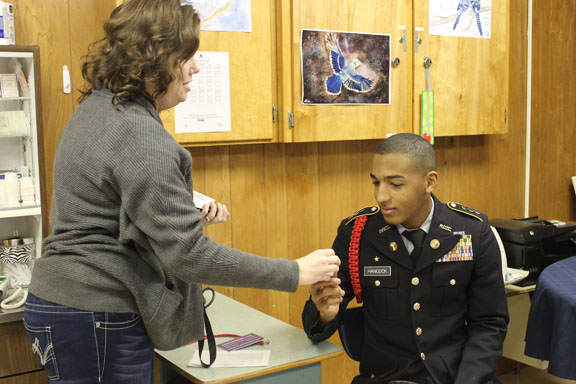Flu hits JCHS by storm

February 4, 2015
The flu season this year has been hitting hard taking down everyone from children in school to adults at work. Some are worried that the flu we have this year is not what is being vaccinated for.
Students are sent home for days at a time, losing the opportunity to learn and having to spend great deals of time to catch up with schoolwork. Teachers are even having to be replaced by substitutes for extended periods of time. When our teachers are absent and subs are put in place, they often teach in a position where they have little to no experience and it lowers the productivity of our students (JSTOR).
“The flu is devastating for schools.” says Mrs. Boland, the school nurse, “Students have to miss school and spend more time catching up with their work”.
The flu hits hardest in schools , because everyone is touching surfaces and other objects, like shopping carts and public toilets, which spreads the virus. In schools where students move to other classes, such as our own, there are even more students touching surfaces and spreading germs, since people move from class to class and don’t usually stay in the same place the whole class period. As reported by the Centers for Disease Control and Prevention, Children, pregnant women, people with health issues, and the elderly are most at risk of getting the flu.
According to the U.S. Department of Health & Human services, symptoms of the flu includes a fever, chills, a cough, sore throat, a runny nose, body aches, and a headache.
Some tips to avoid getting the flu is to: wash your hands, get a flu vaccine, try to avoid contact with anyone who is sick, use hand sanitizer, and avoid touching your eyes, nose, and mouth–which are entryways for the flu virus (WebMD).
“The best way to avoid getting the flu, is to just wash your hands constantly and avoid those who are sick” says Mrs. Boland.
The CDC states that the flu virus is spread by saliva from an infected person coming in contact with entryways of another person (eyes, nose, and mouth). This means that if someone sneezes, coughs, or even just talks can possibly spread the flu virus.
You can also carry the flu virus before being infected by it. The flu can be spread approximately one day before you show any symptoms.
If you have the flu you should stay at home, avoid getting other people sick, and get plenty of water and rest. Recovering from the flu can take days or even weeks, depending on how healthy the person was before they got the flu.



























